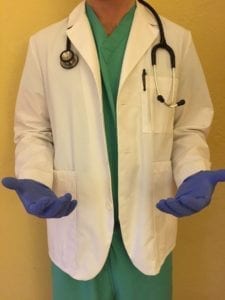Andrew Schroeder
Des Moines, Iowa, United States
 |
My first overnight shift as a third-year medical student in the Emergency Department: the nervous anticipation had been building all afternoon. Of course nothing really tangible separates a day-shift from a night-shift, except perhaps a feeling of well-restedness by the end of a long series of night-shifts. The anticipation, however, like something big may happen, is near tangible. I suppose things are always more dramatic at nighttime.
The call came around 11pm. A man was found down. EMS was resuscitating, transporting, and calling to announce their imminent arrival. The Emergency Department, at a baseline din of background activity, lurched into action. A nurse opened the trauma-bay doors. Another guided the name-brand, multi-million-dollar medical boom along its slick-gliding track and out of the way to facilitate entry of a stretcher into the room. Dr. K took note of the call while moving to inform another patient of a just-received test result. He absorbed the information over-his-shoulder as he moved away, returning just moments later with a quick breath and a glance my way.
We moved toward the trauma bay, and a nurse asked me if I had ever done chest compressions before. This was it – the night-shift experience I had been anticipating. The nervous anticipation turned to nervous excitement. Did I sense the same from Dr. K? Was that a tiny, mischievous smile? This was definitely the reason he chose Emergency Medicine.
Wait a second? What — is that guilt? Yes, I definitely felt something like a twinge of shame and guilt. I guess that is what I get for rooting for an exciting case and an active role. I tried to hide my smile as the room filled with people in preparation for EMS’s arrival. But then I sensed the same thing in the room, the same muted excitement I felt. A bunch of adrenaline junkies waiting, mostly respectfully, for “the main event.” Across the room, Dr. K cracked a quiet joke as he donned his gloves, releasing some of the pressure from the room. He caught my eye and moved closer to impart some wisdom to his student.
“Make sure you have all of your equipment ready,” he said. He wheeled the laryngoscope cart closer. “They probably have secured an airway, but we can’t be sure.”
Nurses who had tucked their patients in for the next few minutes showed up in the doorway, anticipating the start of the chaos. I felt my pulse quicken beneath my gloves and scrubs. I counted a few breaths as the room, now with ten or twelve people in it, shifted its weight nervously. Dr. K stood a little taller than I had seen him in the first five hours of the shift. The wheels of the stretcher squeaked and strained as they rolled through the sliding doors and into the trauma bay. The automatic chest compression device pumped noisily and quickly like a runaway train rhythmically clacking down the tracks. EMS personnel hurried around the stretcher, blurting out the pertinent facts of this man’s story as they transferred him from the stretcher to the Emergency Room bed. He was found down. They do not know for how long. He has had no pulse or respirations since they found him.
The commotion continued for five or six minutes. The man’s skin was mottled and gray. Sadly, although appropriately, nurses and staff began exiting the room as they learned their assistance would not be required. The nurses in the doorway realized we would not resuscitate this man and made their staggered exits as well.
Dr. K called it, patient pronounced deceased at 11:29 pm. There were three people left in the room. A purposeful grief replaced the nervous excitement as we removed the medical equipment from the man’s lifeless body. I was unsure how long to stay in the room, and a bit depressed at the anti-climactic end. No chest compressions. No intubation. The guilt returned immediately, for even beginning to feel sorry for myself. But then again, I think, he probably wishes we all could have done more as well.
ANDREW C. SCHROEDER attended the University of Notre Dame and is now a third-year medical student at Des Moines University. He is interested in vascular surgery and hopes to continue writing about his experiences in medicine.
Highlighted in Frontispiece Volume 9, Issue 4 – Fall 2017
Spring 2017 | Sections | Personal Narratives

Leave a Reply